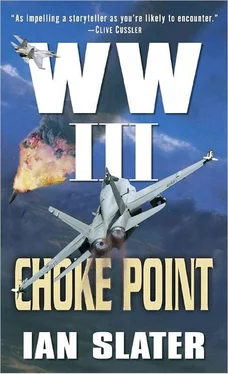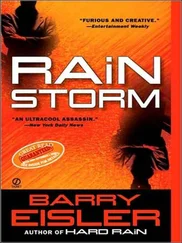“Air strike possible?” asked Dixon, his own question answered as he looked about at the sea mist and fog hugging the coast like a coat, not a single tree visible atop the cliff from which the falls cascaded.
“Weather’s socked us in,” said Freeman, raising his voice again over the sound of the falls. “Anyway, by the time Whidbey got any ASW birds airborne, the sub’d be outta here.”
For several moments no one spoke, and in the dreary gray world that had enveloped the crescent bay and surrounding coastline, all they could hear was the continuing thunder of the falls and the ocean’s unceasing attack against their rocky islet. Freeman’s mind was racing like a computer, drawing on all his past experiences — from the steamy jungles of Southeast Asia to the bone-cold engagements on the north German plain and the forays of his SpecFor teams in the snow-packed mountains of the Pacific Northwest itself, where he, Choir, Aussie, Sal, and David Brentwood had gone toe-to-toe against white supremacist militias.
“There is one way,” Freeman announced, his eyes fixed on Aussie Lewis.
“Damn,” said Lewis. “I think you want me to get wet again, General.”
Freeman’s weathered face turned to Dixon. “How ’bout you and Aussie strap on those Draegers and go under the falls again — only this time come up shooting. It’ll be the last thing they’ll expect.”
Dixon nodded, slowly, either from a distinct lack of enthusiasm or because of his failure to envision the whole plan. “You want us to pin them down?”
“No,” said Freeman. “I want you to kill them.”
“While you three make an end run around the end of the falls in the RIB,” Aussie said. “Right?”
“No,” said Freeman. “We three’ll do something else they won’t expect.”
“You’re going to attack through the falls,” said Aussie.
“Affirmative,” confirmed Freeman. “Full bore through the middle.” The general slapped Choir on the shoulder. “Think you can handle that, my friend?”
“Piece o’ cake,” said Choir.
“Jesus!” put in Sal. “Those falls’ll sink us.”
“Not if we hit ’em at full power,” the general assured them, with more confidence than he felt. True, the falls were no more than three or four feet through, but with the tumbling force of thousands of gallons a second, the impact would be tremendous. It would be, in the parlance of his British SpecFor compatriots, “a close run thing.” If Choir couldn’t master the wheel in the crushing wall of water, if the good Welshman allowed the inflatable to veer slightly one way or the other away from a right angle impact, the skew torque, as Aussie Lewis so eloquently warned them, would send the RIB “ass over tit,” upending it, dumping the legendary general, Salvini, and coxswain Choir into the swirling water moat between the falls and the midget sub.
“Sitting ducks,” Aussie told them.
“Thank you,” riposted Choir, “for your vote of confidence.”
“Biggest thing you’ve steered,” said Aussie, “is one of those dorky piss pots you Welsh paddle across a creek!” He was referring to a Welsh coracle, the ancient basketlike and portable one-man boat made from the small branches of shrubs and trees and still used by quiet water fishermen.
“Hurry up with those Draegers,” the general told Aussie and Dixon, “before they cast off.”
Dixon easily put the Draeger on, he and Albinski having gotten used to donning their rebreather units with the same ease and confidence of long practice with which Aussie Lewis handled his Heckler & Koch MP submachine gun. “These weapons are waterproof, right?” Dixon asked Lewis.
“Well,” began Aussie, “if you—”
“Quiet!” It was Salvini, his concentration so focused that he was the first to hear the sound. A faint but distinct rumbling.
“A diesel?” proffered Dixon anxiously. “So much for it being nuclear powered.”
“Synchronize watches,” ordered Freeman. “We hit the falls at 0814, in five minutes.”
“Five minutes, at 0814,” acknowledged Dixon, followed by Aussie, who, like Dixon, was spitting into his face mask, quickly rubbing the saliva about to guard against condensation. It reminded Dixon of his dives with Rafe Albinski.
“Go!” Freeman ordered, and both Aussie and Dixon dropped backward into the sea.
“Into the RIB,” Freeman told Choir and Salvini. “Lash the tarp tight over the gear.”
Choir was already priming the outboard’s gas pump, while Salvini, anticipating the interval between the rise and fall of the Bruiser, adroitly jumped to the inflatable and immediately began securing the weapons, ammo, and other equipment.
Freeman quickly handed his HK submachine gun down to Sal to have it clipped into its rack. It was a race before the midget sub cast off and submerged, free to resume its unseen control of the strait’s choke point.
Freeman’s gung-ho body language exuded confidence, and the instant he was on the prow of the boat, he was taken back to the exact moment in which his desire to be a leader had crystallized, the moment when, as a young boy, he’d first gazed upon Emmanuel Leutze’s famous painting of Washington crossing the ice-floe-choked Delaware, the revolutionary general standing proudly in the boat’s prow.
Freeman’s confidence, however, was qualified by his own surprise at the terrorists not having already followed up on the burst of fire by their lookout, whose vigilance had unwittingly given away their position. It had only been fifteen minutes ago, but Freeman knew that if he’d been in command on the other side of the falls, he would already have had his men launch some kind of follow-up attack against the five Americans. Why hadn’t the enemy done so?
As Freeman tried using his satellite phone, to no avail — the atmospherics still dominated by the frying-fish sound of interference in the ionosphere — he caught sight of Aussie Lewis’s flippers. Aussie had momentarily surfaced to get his bearings before making a deep tumble dive to get well below the underwater turbulence of the falls before swimming the hundred feet or so to the sub. The fact that the general, Choir, and Sal all agreed it was Aussie, although his gear was exactly the same as Dixon’s, bore testimony to how closely they had worked over the years. They were like friends distinguishing each other from a crowd not by physical features, but merely by the way they moved, reading one another’s body language with an unconscious certainty that amazed Dixon, the newcomer.
The Coast Guard diver, having more experience in the strait than Aussie Lewis, had not felt the need to surface to make sure of his bearings. Now, he was waiting on the other, landward, side of the falls, in the darker water that served as a moat between the falls’ deafening torrent and the sub — whose type, other than it being a midget, was still a matter of speculation. Not even the identity of the balaclava-masked terrorist he and Aussie had spotted earlier was known, though Dixon was confident that he and the rest of the SpecFor team would soon find out. It was three minutes since he and Aussie had left the islet. Another two minutes and Freeman, Choir, and Sal should come through the falls like gangbusters, and then the five of them would open up.
Aussie, for his part, estimated that Freeman, Sal, and Choir should reach the sub in short order. A couple of HE grenades down the hatch from either Sal or the general would do nicely, he thought, certainly enough to delay the bastards until either the NR-1B or a Coast Guard gunboat could arrive for the coup de grace. Relying on the waterfall’s turbulence, now a mere fifty feet behind them, neither Aussie nor Dixon anticipated any problem surfacing.
Читать дальше












